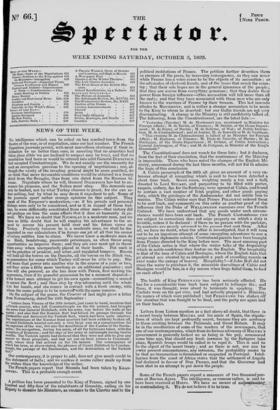A petition has been presented to the King of France,
signed by one „htuldred and fifty-four of the inhabitants of Grenoble, calling on his ataJestY to dismiss his Ministers, as enemies to the Charter and to the political institutions of France. The petition further describes them as enemies of the press, by necessary consequence, as they can never while France has a voice cease to be the objects of its accusation ; as the advocates of electoral frauds, and of the taxes that crush the coun- try; that their sole hopes are in the general ignorance of the people; that they are averse from everything generous; that they derive their power from foreign influence—(this accusation will tell more than all the rest); and that they have associated with them men who are only known to the warriors of France by their treason. This last inuendo alludes to BOURMONT, and is rather a strange accusation to be made to the King to whom he deserted : but our Gallic friends are not very discriminating. A change in the Ministry is still confidently talked of. The following, from the Constitutionnel, are the latest lists :— " Yesterday (Tuesday) M. de Mortemart was mentioned as Minister for Foreign Affairs ; M. de Berbis, of Finances ; M. Delalot, of the Home Depart-. ment ; M. de Rigny, of Marine ; M. de Belleme, of War ; of Public Instruc- tion, M. de Chateaubriand ; and of Justice, M. de Bonville or M. de Vaublanc.
"This evening M. de Chatcaubriand is talked of as Minister for Foreign Affairs ; M. Humann, of Finance ; M. Hyde de Neuville, of Marine ; M. de Martignac, of the Home Department ; N. Delalot, of Public Instruction ; General Ambrugeac, of War ; and M. de Polignac, as Minister of the King's Household."
The Constitutionnel does not vouch for these lists ; but it declares, from the fact of their circulation, that the continuance of the Ministry is impossible. Those who have noted the changes of the English Mi- nistry, announced during the last three months, will not fail to admire the logic of this conclusion. A Calais paragraph of the 26th ult. gives an account of a very ex- tensive attempt at smuggling which is said to have been detected a short time back. Seven cases, weighing nearly a ton and a half, directed to Lord STUART, and purporting to be filled with porter, carpets, sadlery, &c. for theEmbassy, were opened* Calais, and found to contain a vast number of Irish poplins, and other goods paying duty, which the privileges of the Ambassador did not entitle him to receive. The Calais writer says that•Prince POLIONAC ordered them to be sent back, and comments on this order as another proof of the influence that the Duke of WELLINGTON exercises over the French Cabinet. We have understood that any goods under such circum- stances would have been sent back. The French Customhouse (we are subject to correction) does not seize property on which a duty is leviable, unless it be declared : if there be no person with the package, its contents aro merely returned to the person that sent them. After all, we have no doubt, when the affair is investigated, that it will turn out to be an ingenious attempt of some smuggling adventurer to run a cargo under diplomatic colours. Contraband parcels have been brought from France directed to the King before now. The most amusing part of the Calais notice is that where the writer talks of the hospitality which in noble confidence they bestow on the English. The hospitality is that of the inns of Calais and Boulogne, where the English fools that go abroad are cheated by as impudent a pack of swindling rascals as exist under the canopy of heaven. Hospitality l—ifJohn Bull did not cross the water to purchase it, the miserable starvelings of Calais and Boulogne would be fain, in a dry season when frogs failed them, to feed on each other !


















